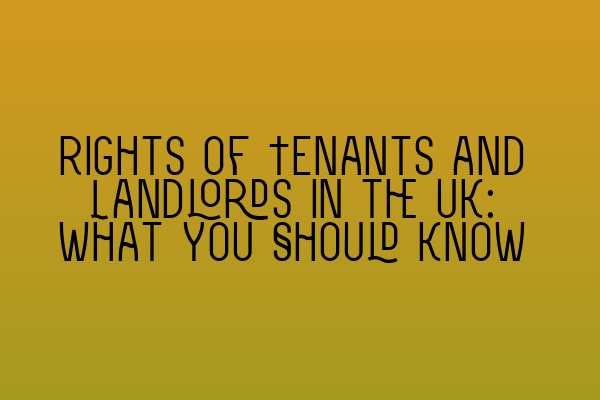Rights of Tenants and Landlords in the UK: What You Should Know
Welcome to SQE Property Law & Land Law, where we specialize in providing expert legal advice and services related to property law in the UK. In this article, we will be discussing the rights of both tenants and landlords, covering important aspects that everyone should be aware of. So whether you are a tenant looking to understand your rights or a landlord wanting to ensure you are in compliance with the law, this article is for you.
Tenant Rights
1. Right to Written Agreement:
One of the most important rights for tenants is the right to a written tenancy agreement. This document outlines the terms and conditions of the tenancy, including the rent amount, duration of the tenancy, and responsibilities of both parties. It is essential for tenants to carefully review this agreement before signing.
2. Right to a Safe and Habitable Property:
Tenants have the right to live in a property that is safe, in good repair, and free from hazards. Landlords are responsible for ensuring that the property meets certain standards, such as adequate heating, functioning plumbing, and electrical safety. If a tenant discovers any issues, they should inform the landlord promptly and request repairs.
3. Right to Privacy:
Tenants have the right to privacy in their rented property. Landlords should not enter the property without proper notice, except in cases of emergency. It is essential for landlords to respect the tenant’s privacy and obtain consent before entering the property for inspections or repairs.
4. Right to Protection from Unfair Eviction:
Tenants are protected from unfair eviction under the law. Landlords must follow proper procedures and provide valid reasons for evicting a tenant, such as non-payment of rent or breach of tenancy agreement terms. It is crucial for tenants to be aware of their rights in eviction situations and seek legal advice if necessary.
5. Right to Challenge Rent Increases:
If a landlord wishes to increase the rent, tenants have the right to challenge the increase if they believe it is unfair. The rent increase should be reasonable and in line with market rates. Tenants can negotiate with the landlord or seek advice from organizations that specialize in rental issues if they think the increase is unreasonable.
For more in-depth information about tenant rights, including eviction procedures and deposit protection, you may refer to our SQE 1 Preparation Courses.
Landlord Rights
1. Right to Receive Rent:
Landlords have the right to receive rent payments from their tenants as agreed in the tenancy agreement. Tenants are obligated to pay rent on time and in full. In case of non-payment, landlords have the right to take appropriate actions, such as issuing reminders, pursuing legal action, or seeking possession of the property.
2. Right to Proper Use of the Property:
Landlords have the right to expect their tenants to use the property responsibly and in accordance with the agreed terms. This includes not damaging the property, maintaining cleanliness, and adhering to any specific regulations or restrictions set by the landlord.
3. Right to Recover Possession of the Property:
If a tenant breaches the tenancy agreement or fails to pay rent, landlords have the right to seek possession of the property. However, eviction procedures must be followed correctly, and landlords should seek legal advice to ensure they are in compliance with the law.
4. Right to Proper Notice:
Landlords have the right to terminate a tenancy but must provide proper notice to the tenant. The notice period required depends on the type of tenancy and the reason for termination. It is crucial for landlords to be familiar with the legal requirements and include all necessary information in the notice.
5. Right to Deduct Reasonable Costs from Deposits:
Landlords can deduct reasonable costs, such as repair fees or unpaid rent, from the tenant’s security deposit at the end of the tenancy. However, this must be done in accordance with the law and with proper justification. It is important for landlords to keep detailed records and provide an itemized list of deductions to the tenant.
For more information on landlord rights, including how to draft a tenancy agreement and the eviction process, you may find our SQE 2 Preparation Courses useful.
Conclusion
Understanding the rights of tenants and landlords is crucial for a harmonious and mutually beneficial rental experience. Tenants should be aware of their rights to a written agreement, a safe and habitable property, privacy, protection from unfair eviction, and the ability to challenge rent increases. Landlords, on the other hand, have rights regarding rent collection, use of the property, recovery of possession, notice requirements, and deducting costs from deposits.
If you have any specific questions or need legal assistance regarding property law and landlord-tenant rights, please don’t hesitate to contact us at SQE Property Law & Land Law.
Related Articles:
